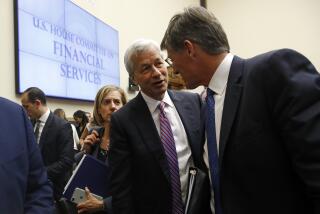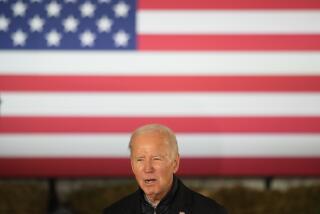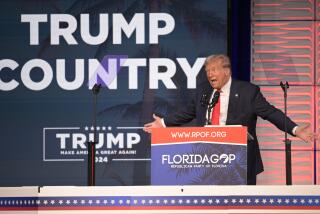Column: Trump speech: Promise the world, leave out the details

President Trump outlines his agenda to Congress and touts “promises kept” in his first month in office.
President Trump boasted in his speech to Congress Tuesday that he’s keeping the many campaign promises he made to voters, beginning with his pledges to boost economic growth and slash regulations on business.
“A new chapter of American greatness is now beginning,” he said. “Dying industries will come roaring back to life.... Our neglected inner cities will see a rebirth of hope, safety and opportunity. Above all else, we will keep our promises to the American people.”
But the president’s bravado masked a harsher reality: His agenda’s already in trouble — for the simple reason that it’s inconsistent and unrealistic.
It’s true that the president has kept several of his promises — the easy ones.
He’s signed, with a jagged flourish, dozens of executive actions. He’s told federal agencies to cut regulations (although few have actually been eliminated; it’s a time-consuming process). He’s ordered a wave of deportations of undocumented immigrants. He’s pulled out of a trans-Pacific trade deal. He’s jawboned a handful of companies into preserving a handful of American jobs.
[Here’s] Trump’s plan: cut taxes, eliminate regulations, and pray for a boom. It would be nice if it happened, but economists think it’s unlikely.
That, plus hints of lower tax rates to come, has been enough to send the stock market soaring — one of the achievements Trump claimed Tuesday evening.
But Trump’s most ambitious promises — a much longer list — are a long way from getting done.
Beyond deep cuts in taxes, he’s proposed a wall on the border with Mexico, a trillion dollars’ worth of infrastructure and better health insurance at lower prices. Also a balanced budget, all without cutting Social Security or Medicare.
Budgeteers from both parties say it’s impossible; the arithmetic simply doesn’t add up.
Republican leaders in Congress see little sign of a workable plan from the White House. They’re worried that Trump — who won’t acknowledge he can’t balance the budget without touching entitlements — will ultimately opt for deficit spending. (Trump neglected to mention balancing the budget Tuesday evening, as they must have noticed.) So they are reminding all comers that legislators are the ones who make decisions on tax cuts and spending bills.
Wary of charging into disaster, they have ignored Trump’s demands for quick action to replace President Obama’s healthcare law and are moving at their own predictably measured pace.
Lawmakers are also pushing back on an idea that should have been a gimme: Trump’s announcement this week that he will seek an increase of roughly 10% in defense spending.
The $54-billion jump the president proposed was only a little more than Obama had projected, and well below the numbers sought by defense hawks like Sen. John S. McCain of Arizona.
But the White House immediately ran into trouble by suggesting it would pay for the defense hike by exacting deep cuts from the State Department and the Environmental Protection Agency.
The arithmetic, again, doesn’t work: The combined budgets of State and EPA come to no more than $67 billion, so extracting $54 billion would be impractical.
And when White House officials said they’d target foreign aid, presumably figuring that would be a politically popular target, some leading Republicans revolted.
Sens. McCain, Lindsey Graham of South Carolina and Marco Rubio of Florida all said cutting foreign aid was a bad idea. “It would be a disaster,” Graham said. “It shows a lack of understanding of what it takes to win the war.”
Retired Gen. David H. Petraeus and 120 other generals and admirals even signed a letter defending the State Department budget. The letter quoted then-Gen. James N. Mattis, now Trump’s secretary of Defense: “If you don’t fund the State Department fully, then I need to buy more ammunition.”
When Trump was asked about the proposal before his speech, he didn’t bother to defend its details — suggesting either that he didn’t know the specifics, or that it wasn’t a serious idea to begin with.
“I think the money is going to come from a revved up economy,” he said on Fox News. “If I can get [growth] up to 3% or maybe more, we have a whole different ball game.”
In the end, that’s the whole of Trump’s plan: cut taxes, eliminate regulations, and pray for a boom. It would be nice if it happened, but economists think it’s unlikely.
It’s not a knock on Trump that he hasn’t delivered on his biggest promises; his presidency is still only in its fifth week.
But without a budget plan or legislative strategy, much of his agenda could turn out to be what Silicon Valley calls “vaporware”: promises without a product. And his sonorous, un-Trumplike speech on Tuesday — with its call to both parties to abandon “small thinking [and] trivial fights” — will be remembered, alas, as empty words.
Twitter: @DoyleMcManus
Follow the Opinion section on Twitter @latimesopinion or Facebook
More to Read
A cure for the common opinion
Get thought-provoking perspectives with our weekly newsletter.
You may occasionally receive promotional content from the Los Angeles Times.







